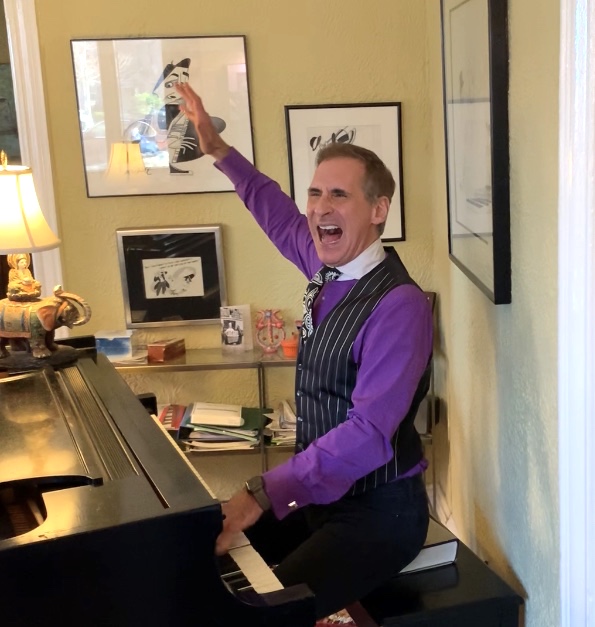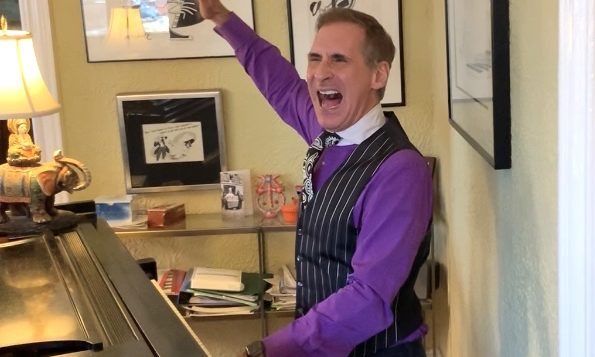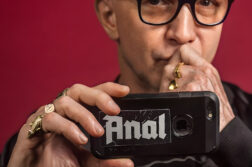FOR FANS of cabaret performance (bless them!), Mark Nadler is a familiar name. He has performed in virtually every cabaret venue in New York City and has toured the world, winning many awards and rave reviews.
 During the Covid-19 lockdown in New York City, Nadler sheltered with his partner Dominic Meiman and their dog Figaro, and he decided to do something to cheer up his fellow New Yorkers, and others around the world, by performing a daily song from his immense repertoire and then posting it on-line for all to view. The response to “A Daily Bit of Mark” on You-Tube was instantaneous and sensational, with thousands of views and hundreds of emails of appreciation. Nadler’s encyclopedic knowledge of the American songbook was on full display (the videos are archived at marknadler.com), and the response showed how many people still love the old standards when well performed.
During the Covid-19 lockdown in New York City, Nadler sheltered with his partner Dominic Meiman and their dog Figaro, and he decided to do something to cheer up his fellow New Yorkers, and others around the world, by performing a daily song from his immense repertoire and then posting it on-line for all to view. The response to “A Daily Bit of Mark” on You-Tube was instantaneous and sensational, with thousands of views and hundreds of emails of appreciation. Nadler’s encyclopedic knowledge of the American songbook was on full display (the videos are archived at marknadler.com), and the response showed how many people still love the old standards when well performed.
What fans didn’t know was that Nadler caught the Covid virus himself during the lockdown, but continued performing despite being very ill. Nadler spoke to me by phone from his home in New York City.
Mark Nadler: I was a little kid. I honestly don’t remember a time when I didn’t love musicals but also performers or performing. I watched The Carol Burnett Show as a kid. This was the time of variety shows. The musicals were being broadcast on TV too. I did my first performance when I was five years old. Of course it was some sort of show tune, though I can’t recall which one.
MH: What performers have been most influential for you?
MN: The performer who probably had the most influence on me is Bugs Bunny, to tell you the truth. It’s just his whole playfulness with music. My mom had a record collection that included Ethel Waters and Mahalia Jackson, so the sounds of those people’s voices had an influence. Waters was acting out the songs, and of course Mahalia’s voice was just thrilling. There were the gay icons: Judy Garland, Barbra Streisand, Bette Midler. Bette influenced me a great deal. Just the idea of being such an entertainer, someone who can make you laugh, who can make you cry. Someone who rides the edge the way that she did. All of that really appealed to my teenaged rebelliousness. Just to hear the bawdy jokes. She was doing rock and roll songs, she was doing Kurt Weill—the choice of material was so eye-opening to me. That you could mix and match like that—oh, my god, you really can wear paisley and stripes! If you do it right.
MH: So that takes us through your formative years. How and where did you actually get started as a cabaret performer?
MN: I was born in Waterloo, Iowa. I realized pretty early on that I was going to have a very hard time of it if I had to go to high school there, given the fact that I was Jewish and into show tunes (read “gay”)! I was getting beat up in school a lot for not being athletic and, frankly, for having killed Jesus. So, as I had already been performing for groups like the Kiwanis Club and the Rotary Club, I was a pretty seasoned performer by the age of ten. I went to a place called the Long Straw Saloon in Cedar Falls, Iowa, and I got a job entertaining there. The place had singing saloon girls, so adding a little kid who could entertain to the mix was a big draw. I worked there all through my teens and was thus able to pay for a boarding school for the arts in Michigan called the Interlochen Arts Academy. Because of that experience, when I first came to New York, right after high school, I was able to get a job as the house music director and master of ceremonies at a New York City cabaret called the West Bank Café. It’s now called the Laurie Beechman Theatre, and it’s still my preferred cabaret room to play in New York. I created my own act for that room and was pretty successful. That’s how it began.
MH: You’ve also had a career in musical theater, including Broadway and Off-Broadway shows. Can you talk about some of the high points?
MN: I have appeared Off-Broadway and even wrote two shows, which I starred in. I’ve done both straight plays and musicals. (One “straight” play I did was The Boys in the Band). Both of the shows I wrote and starred in Off-Broadway—American Rhapsody and I’m a Stranger Here Myself—were nominated for Drama Desk Awards.
On Broadway, I was the onstage pianist for the first show that Dame Edna did on Broadway called Dame Edna: The Royal Tour. I was the replacement cast for that part. I was also in a huge flop called The Sheik of Avenue B. It was technically a Broadway run, because it was in a 1200-seat theater in the Broadway district called Town Hall, and we ran for ten weeks. But if you try to find the show on sites that list Broadway shows, that one never comes up. At the time, it was very exciting, though. It was the first time I played a lead singing, dancing, and playing-piano role on a Broadway stage.
MH: When did the idea first come up of making the Coronavirus videos?
MN: We were in lockdown for a week, when a website called “Theater Pizzazz” asked me to do a video for them. It was my first one, and I performed “Ain’t Misbehavin’.” It got such a response that I decided, what the hell, I’ll just do one of these every day until we’re allowed to go out again. So I did. I ended up doing 76, without missing a one. What my subscribers didn’t know was that during the early part of that time, I had Covid. I was very ill, but I had made this promise, so I would drink a lot of tea, take a shower, and rally all the troops of my body. My partner would do the video and I’d do the numbers. Then, when it was over, I would just pass out. It was actually very tough, because a couple of times I really felt like I was going to die.
MH: Wow, that sounds pretty intense.
MN: It was. The thing that I found out about Covid was that it affects the memory. I was careful to choose songs that I knew really well so there wouldn’t be any problem. There were songs that I had been performing for forty years, and I was having trouble with the lyrics. So we had to do multiple takes. And sometimes I was having trouble singing, and I would just explain to the audience that I had a frog in my throat. I didn’t want them to know I was sick because the whole idea of the videos was to take them out of all of that tragedy that was going on around us. So it was very challenging but as they say, the challenges can be good and what doesn’t kill us makes us stronger.
MH: Unless, of course, it does kill us.
MN: But it didn’t. At the time, Chris Cuomo had Covid, and he was doing his broadcast from his basement. I found that really inspiring, so I felt this was sort of my version of that. I’m a big believer in the show must go on. I’ve never missed a performance in my entire life. Actually, that’s not true. There was one performance I couldn’t get to, and that’s because there was a blizzard, and I literally couldn’t get to the venue. It was in West Virginia, and the flight was canceled. I even tried to drive, but there was no way to get there.
MH: Back to the recent videos, what kind of response did you get from your audience?
MN: I got so much positive feedback from the videos. I got hundreds of emails every day from people who watched them. They felt connected to me. They wanted to talk about the songs I performed, my clothes, my dog, the house. It just gave them something to do that was not about themselves and not about having to stay inside. I felt like I was doing a service, and that makes you a lot stronger.
MH: So much of what you do as a cabaret performer relies on a live audience, which wasn’t out there when you were making these videos. How was that different?
MN: It was like performing on camera. Each of the songs that I perform is like a little play, so it’s a scene that I’m playing. So it was like on-camera acting. Or else I performed for my partner, who was behind the camera. And sometimes I performed for my dog Figaro.
MH: You clearly manage to touch people with your performances, both live and on video.
MN: I think cabaret is the most underrated form of entertainment. It’s my favorite kind of live entertainment, when it’s really well done. I prefer an excellent cabaret to a work of theater or ballet. Because when it is excellent, it’s one person completely baring their soul to you through song, in a funny way, in a touching way. And you have a real human relationship with that performer, and it’s a very exciting thing.
MH: You’re fully recovered. How are you feeling now?
MN: I’m fine, but it has altered my sense of smell. In my left nostril I constantly smell chalk. It’s odd. I also haven’t been having much physical exercise—I’m usually tapdancing several times a week—so I’ve lost a lot of strength, and it will take time to get that back.
MH: How do you feel about how things are in New York City now?
MN: I think things are better. People are starting to feel a bit more optimistic. I think there’s a sense of pride because we did what needed to be done to bring this under control. I wish the rest of the country had used us, and Governor Cuomo, as a model. This was obviously the way to go. The fact that other places aren’t following his lead is beyond me.
Matthew Hays, co-editor of the Queer Film Classics book series, teaches film studies at Marianopolis College in Montreal.





